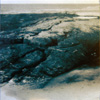Kawabata Makoto, "White Summer of Love Dreamer"
 I haven't been paying too much attention to Acid Mothers Temple for quite some time, as their formula of tripped-out, burbling maximalism started to yield rapidly diminishing returns for me after a few albums.  Still, I often find Kawabata's periodic departures from his core sound to be pretty enjoyable and this is one such case: a pair of hypnotically repetitive and largely acoustic solo pieces.  It is always enticing to hear what Makoto can do when he is not rocking out beneath an electronic maelstrom of bloops and whooshes.
I haven't been paying too much attention to Acid Mothers Temple for quite some time, as their formula of tripped-out, burbling maximalism started to yield rapidly diminishing returns for me after a few albums.  Still, I often find Kawabata's periodic departures from his core sound to be pretty enjoyable and this is one such case: a pair of hypnotically repetitive and largely acoustic solo pieces.  It is always enticing to hear what Makoto can do when he is not rocking out beneath an electronic maelstrom of bloops and whooshes.
The first half of this album is devoted to its 20-minute title piece, which is based upon an unexpectedly languid and melodic finger-picked acoustic guitar loop.  As it lazily unfolds, something that sounds like a distant and forlorn-sounding French horn emerges to weave a sad and simple melody while a number of other distant moans and whines begin to drift in and out to provide color and passing harmonies.  Shortly after the 7-minute mark, Kawabata steps in to accompany the lonely moans with his own wordless vocals, but soon launches unexpectedly into a half-sung/half-chanted actual verse (aided by a heavy dose of reverb).  At some point during his vocals, the underlying guitar part is surreptitiously (and seamlessly) reversed and a sitar-like buzz becomes more prominent, which is a pretty neat trick.  Soon after, Kawabata's vocals cohere into a lazily repeating refrain of sorts, which he artfully doubles with some sarangi to make it sound like he is being accompanied by a delayed and higher-pitched second vocalist.  The sarangi doppelganger gradually subsumes Makota’s own voice and lulls the song to a fading close.  It's ultimately a likable piece, but it hard to put my finger on exactly why it works, as it is rather amorphous and Kawabata's brief singing interlude seems both anomalous and puzzling.  Even so, it manages to be sleepily mesmerizing and the interplay between the various elements is inventive and well-arranged.  It certainly feels somewhat sketch-like, but the sketch is a promising one.
The second side consists solely of the similarly epic "The Looking Glass Love," which begins with a tense and endlessly repeating acoustic guitar loop and essentially sticks with that as the backbone of the song for its entire duration.  It's a gambit that works quite well, as the endless looping guitar quickly sucks me into the song's pulse and provides a solid foundation for whatever Kawabata feels like throwing at me for the next 20 minutes, which in this case sounds a lot like an darker, unplugged version of AMT's signature spaced-out mindfuckery.  Well, not entirely unplugged, as there is some unrecognizably processed electric guitar involved, but Makoto also employs an eclectic array of other instruments ranging from hurdy-gurdy to tambura.  He seems especially fond of creating buzzing discordant harmonies between multiple droning notes, which nicely enhances the already ample tension and evokes a palpable sense of dread as well. Gradually, the drones threaten to steal the foreground from the guitars and drag the piece towards something that resembles a submerged and warped bagpipe ensemble, but they never quite succeed.  The endless tug-of-war between the song's central guitar motif and the queasy droning and late-song electronic burbling keeps things pretty compelling and makes for a somewhat nerve-jangling but satisfying composition.  Of the two pieces, it is by far my favorite, largely due to its unsettling edge and more engaging pace and structure.
White Summer of Love Dreamer is a pretty likable and unusual release for Makoto, but it is also a somewhat minor one.  However, the album art is quite stunning (a photograph of a particularly desolate and rocky stretch of beach) and fits the music perfectly, so I am happy to keep this around despite its mixed success.  I would love to hear some more work in this vein, but it ishopeless to try to anticipate what Kawabata will do next: this could be a stage in an evolution towards a fruitful organic and drone-informed future or merely a temporary digression.  I guess I’ll just have to wait and see.
 



